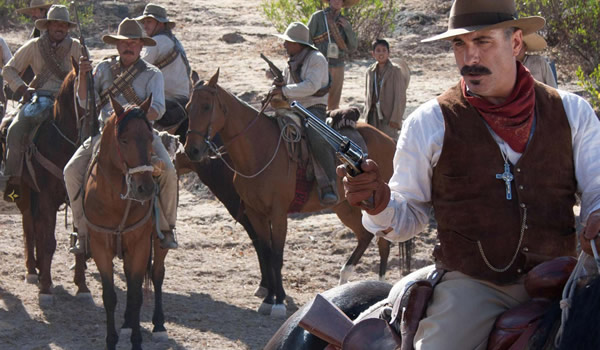A Pakistani national could be planning to place chemical agents in the ventilation system of Rafik Hariri International Airport, al-Akhbar newspaper …
Judge Saqr Saqr decided on Tuesday to release Shadi al-Mawlawi after over a week in custody. Islamist al-Mawlawi will be released on bail …
The muftis and clerics of Akkar on Sunday stressed that they will not allow any side to stir a strife …

— Carl Anderson is CEO of the Knights of Columbus
he topic of religious liberty has been in the headlines a great deal recently, and in two weeks it will be on the big screen as well.
Years in the making, the film For Greater Glory tells the story, which has been all but forgotten, of the Mexican government’s persecution of the Catholic Church. It is a story of exiled bishops, murdered priests, and eventually a civil war: a war fought over religious freedom.
Americans of all faiths should watch this film. And they should thank God that they live in the United States, in a country ruled by law, where our differences are decided in courtrooms and with ballots rather than bullets.
Threats to religious freedom everywhere have certain similarities. A government attempts to take away from its people a fundamental right. It attempts to redefine how its people can think. In Mexico in the late Teens and Twenties, enforcement of the laws was violent, and violence begot more violence, and soon the entire country was engulfed in a civil war.
Nearly nine decades later, in the United States, a country that functions under the rule of law, we will protect our rights very differently. When people of faith in the United States respond to government intrusion into our First Amendment right of the free exercise of religion, we do so with civility, and with the knowledge that courts and elections have power to effect change.
For Greater Glory is a stark reminder that not every country has the stability, meaningful enfranchisement, and legal recourse that we enjoy here in the United States.
Mexico in the early 20th century was a turbulent place. Governments and revolutions came and went — violently and frequently. But the Catholic faith, to which the overwhelming majority of Mexicans adhered, held the country together.
Then in 1924 the Mexican government moved to suppress that faith. With the election of Plutarco Eliás Calles as president, it began to enforce anti-Catholic provisions of the 1917 constitution that had mostly been in abeyance until then. One of the government’s first assaults on religious liberty was its attempt to control who could serve as clergy. Foreign priests were expelled — or killed. Clergy were required to register with the government, which reserved the right to determine who counted as a priest.
Next came the move to ban religion from public view. Citizens were told they could “worship” freely, but privately. Priests who wore clerical attire outside their churches or rectories faced large fines. A priest who criticized the government could be jailed for five years, and priests were arrested or killed just for serving their flocks. Catholic organizations, with the blessing of their bishops, started resisting — peacefully at first, but then with arms when they were attacked. The violence snowballed, and soon Mexico was in the grip of a civil war.
Khazen History


Historical Feature:
Churches and Monasteries of the Khazen family

St. Anthony of Padua Church in Ballouneh
Mar Abda Church in Bakaatit Kanaan
Saint Michael Church in Bkaatouta
Saint Therese Church in Qolayaat
Saint Simeon Stylites (مار سمعان العامودي) Church In Ajaltoun
Virgin Mary Church (سيدة المعونات) in Sheilé
Assumption of Mary Church in Ballouneh
1 - The sword of the Maronite Prince
2 - LES KHAZEN CONSULS DE FRANCE
3 - LES MARONITES & LES KHAZEN
4 - LES MAAN & LES KHAZEN
5 - ORIGINE DE LA FAMILLE
Population Movements to Keserwan - The Khazens and The Maans
ما جاء عن الثورة في المقاطعة الكسروانية
ثورة أهالي كسروان على المشايخ الخوازنة وأسبابها
Origins of the "Prince of Maronite" Title
Growing diversity: the Khazin sheiks and the clergy in the first decades of the 18th century
Historical Members:
Barbar Beik El Khazen [English]
Patriach Toubia Kaiss El Khazen(Biography & Life Part1 Part2) (Arabic)
Patriach Youssef Dargham El Khazen (Cont'd)
Cheikh Bishara Jafal El Khazen
Patriarch Youssef Raji El Khazen
The Martyrs Cheikh Philippe & Cheikh Farid El Khazen
Cheikh Nawfal El Khazen (Consul De France)
Cheikh Hossun El Khazen (Consul De France)
Cheikh Abou-Nawfal El Khazen (Consul De France)
Cheikh Francis Abee Nader & his son Yousef
Cheikh Abou-Kanso El Khazen (Consul De France)
Cheikh Abou Nader El Khazen
Cheikh Chafic El Khazen
Cheikh Keserwan El Khazen
Cheikh Serhal El Khazen [English]
Cheikh Rafiq El Khazen [English]
Cheikh Hanna El Khazen
Cheikha Arzi El Khazen
Marie El Khazen